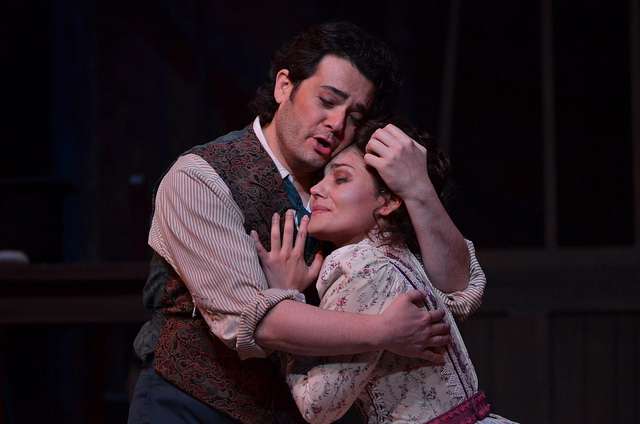|
Back
Better Late Than Never Miami
Adrienne Arsht Center for the Performing Arts
11/17/2012 - & November 21, 24, 27, 30, December 2, 2012
Giacomo Puccini: La bohème
Ailyn Pérez (Mimì), Arturo Chacón-Cruz (Rodolfo), Brittany Ann Renée Robinson (Musetta),
Mark Walters (Marcello), Ryan Milstead (Schaunard), Adam Lau (Colline), Craig Colglough
(Benoit & Alcindoro), Lievens Castillo (Parpignol), Michael Testa (Sergente)
Florida Grand Opera Orchestra and Chorus, John Keene (chorus master), Ramon Tebar (conductor)
David Gately (director), R. Keith Brumley (set design), Malabar Ltd. (costume design), Mark Stanley (lighting design)

A. Chacón-Cruz & A. Pérez (© Gaston de la Cruz/MGO)
Puccini is given so often that many of us take his work for granted, especially La Bohème. Certainly many of the operas he created afterward are more ambitious, but it makes sense that this is the most beloved. Because of the gorgeous music? Of course. But also the direct sincerity which he never really attempted again. When you have already mastered something so perfectly, why repeat it. The unbridled humanity in most Puccini operas is most pronounced in La bohème. When you have attended a good bohème, it is difficult not to get enthusiastic when telling someone. Part of this must come from the fact that it is simply a character study. Try to summarize the plot to someone who is unfamiliar and he or she might think it sounds like drek. Story? Is that really a story? No, it is a slice of life. If you ask for more you will be disappointed. If you appreciate honesty, it doesn't get much more frank, sort of A Tree Grows in Paris.
The good news is it ended up a good performance. The bad news is it should have been better. Because bohème has one of opera's greatest third acts, any mishaps that occur before can quickly be forgotten. The first act's set is fine though way too tidy considering the possibilities of four free living young men. Perhaps had the direction shown an anal retentive side of one of them, it would be more believable. Vocally the Rodolfo of Arturo Chacón-Cruz was the evening's standout; his “Che gelida manina” created many tears in my row. It is not the great power and beauty of a Pavarotti, but the honesty and tenderness of a man who has truly met his soulmate. Mark Walters is a perfect best friend who displays none of his buddy's devil-may-care attitude though at heart proves to be a true lover; his robust baritone is a marvel. Rounding out the quartet are two good actors, Adam Lau as Colline and Ryan Milstead as Schaunard. The four make a good combination in that the personalities remain distinct. Milstead, however, tells of his music lesson with hardly any music. Lau's contribution gives a hint that his fourth act aria will land, which it does with honor and some Pinzaish tone. Lau is one young artist to watch out for. But it is the Mimì of Ailyn Pérez that we are waiting for and she has the goods in addition to being beautiful. Unfortunately conductor Ramon Tebar slows down her first act aria so that her passion cannot really come through. This is love at first sight; we must feel it.
The second act is where the serious problems lie. The set might make it in a third rate dinner theatre. Why are they eating outside at Christmastime in Paris? Then again, since no one looks very cold, was climate change initially taking place over one hundred fifty years ago? So often the set for act two doesn't work. But why is that so when there have been productions that have made it very clear. The last main character, Musetta arrives forcefully but Brittany Ann Renée Robinson's voice is shrill and her stage business is unclear, at times almost vulgar. Given her ridiculous wig and bland costume, she might make one think of Lucy Ricardo auditioning at the Copacabana. And why do the Bohemians all appear so well-coiffed, shaved and dressed? No one looks shabby. Don't regret missing this Christmas Eve party, it was a bore.
But the third act begins and the rest of the evening sails. Every emotion is felt and the chemistry between the lovers blossoms. Strangely as well sung as this performance is, it is the believable acting that keeps it afloat. These are real people being played by real actors who just happen to be terrific singers. Pérez falls shortly after making her entrance and even the most seasoned bohème goer might be startled. Her voice at the end slowly dissolves to a near whisper yet probably can be heard to the last rows of the balcony for a most wrenching death scene. Milstead's intense fear of Mimì's demise is extremely heartfelt using spot on underacting. Rodolfo can sometimes come across as a not so unselfish lover, but his fear of Mimì's future is expressed with an intensity rarely given. We pity his loss as much as Mimì's suffering.
So, yes, you will have a good time. Maybe not one that you will remember for too long but certainly one that will hold you over until it is offered (in a few years) again. And most of us can hardly wait for that.
ConcertoNet is on Facebook
Twitter: @concertonet
Jeff Haller
|